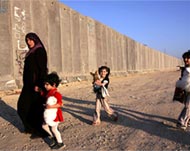Israel to speed building of barrier
Israel is moving to speed up the building of its controversial West Bank barrier after the government approved amendments to its route.

Ehud Olmert, the Israeli prime minister-designate, said at a cabinet meeting on Sunday: “We must go forward as quickly as possible.
“The decisions which we are taking will enable us to complete the security barrier as quickly as possible so that we can best prevent terrorist attacks.”
Tel Aviv was rocked by a suicide bombing two weeks ago.
Olmert recently said he wanted the entire barrier finished by the end of the year.
The weekly gathering of ministers unanimously agreed to the changes to the barrier’s path, which came following a number of legal challenges.
Ariel
As part of the amendments to the route, Palestinians living in villages near the large Jewish settlement of Ariel in the northern West Bank and close to Arab East Jerusalem will no longer find themselves encircled by the barrier.
Due to strong US pressure, Israel has not built the main barrier around the area of Ariel, the settlement bloc deepest inside the West Bank, because it would incorporate about 2% of the West Bank on the “Israeli” side.
 |
|
The wall disrupts the daily life |
In the interim, Israel has begun building a temporary fence around Ariel.
This fence eventually will connect to the main section of the barrier to put Ariel’s 45,000 settlers on the Israeli side, officials said.
Israel occupied the West Bank, including East Jerusalem, after the 1967 war. Israel proceeded to build dozens of settlements, which even its US ally considers illegal, and annexed the Arab part of Jerusalem.
Fences around Jerusalem
Separately, the cabinet voted to lay temporary fencing around areas of Jerusalem where the separation barrier still has not been built.
The government said it was a quick solution to prevent Palestinian suicide bombers from entering the country.
A Palestinian who blew himself up in Tel Aviv two weeks ago reportedly entered the country through the Jerusalem area.
Palestinians said putting up a fence around Jerusalem would make life tougher for thousands of Arab residents who have ties to the city.
They said it would strengthen Israel‘s claims to all of Jerusalem, which the Jewish state calls it eternal and undivided capital.
Anger
“They are keeping Palestinians outside the city in an effort to create facts on the ground and pre-empt a final agreement between the sides,” said Khalil Tafakji, a Palestinian geographer in Jerusalem.
Government officials could not immediately say whether the temporary fencing would include gateways for Palestinians with permission.
If it does not, it will hamper the lives of Palestinians in the area even more than the permanent barrier, which does include passages, said a group that advocates Palestinian rights in the city.
“This means that Jerusalem is becoming hermetic,” said Danny Seidemann, head of Ir Amim.
“The physical barrier will exist well before the mechanism to allow people to move and this will be very disruptive.”
Half-way through
The Israeli defence ministry announced in April that half of the 670km barrier had been erected.
|
“They are keeping Palestinians outside the city in an effort to create facts on the ground and pre-empt a final agreement” Khalil Tafakji, |
Work on the barrier started in June 2004. It is the most expensive project Israel has undertaken.
Israel justifies the massive barrier of electric fencing, barbed wire and concrete walls by insisting it is vital to stopping potential attackers from infiltrating the country and Jewish settlements in the West Bank.
The Palestinians denounce the project as an attempt to grab their land and undermine the viability of their promised state.
Ruled illegal
Both the Palestinians and rights organisations say the wall has disrupted the daily lives of thousands of West Bank residents – including access to jobs, schools, health providers and agricultural fields.
In 2005, the International Court of Justice in The Hague issued a non-binding ruling that parts of the barrier in the West Bank were illegal and should be demolished.
Israel snubbed the ruling by the UN top court.
But Israel’s own supreme court has occasionally upheld complaints filed by Palestinians and ordered changes to the barrier’s path.